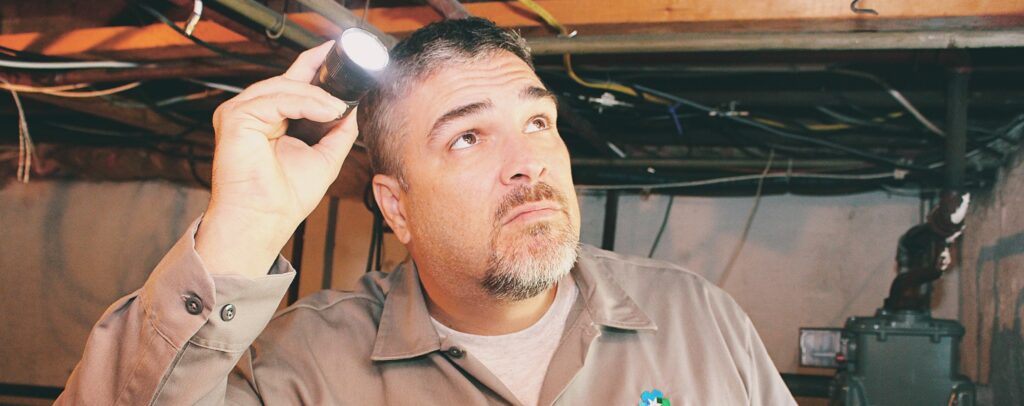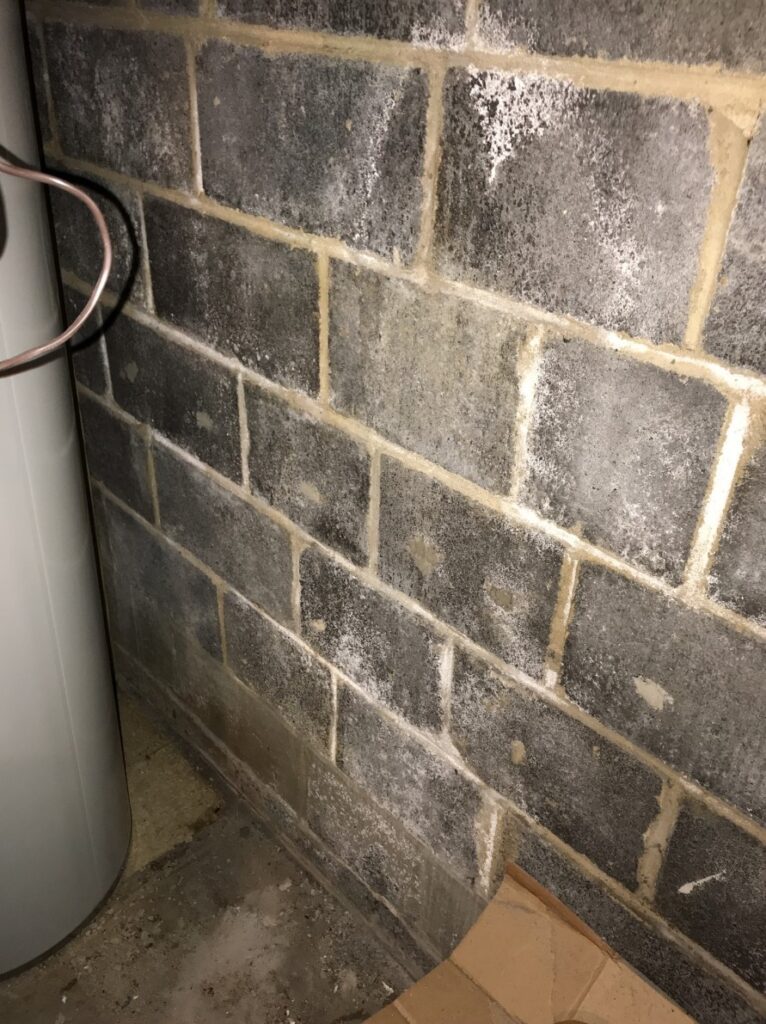
Basement Mold Remediation in New Jersey
Mold plays a vital role in the ecosystem, and for the most part, normal levels of mold in an outdoor environment are completely harmless. When it begins to thrive in excess in an indoor environment, exceeding outdoor levels, is when mold becomes a problem. Mold is opportunistic, and it will thrive anywhere that it is provided with warmth, moisture & a food source.
Unfortunately, many basements in New Jersey homes provide this environment for mold to develop.
Your basement is one of the most common areas in your New Jersey home to experience indoor mold development. Many basements suffer from improper ventilation, insufficient drainage & poor air circulation. Even the slightest amount of excess moisture, such as elevated indoor humidity levels, can be the catalyst for a full blown mold problem in your basement. Let’s take a closer look at some of the more common causes for basement mold in Monmouth County, New Jersey:
- Improper ventilation & poor air circulation
- Condensation
- Humidity levels exceeding 50%
- Foundation issues/water leaking through foundation walls
- Flooding
Dealing With Mold Growth In New Jersey
If you are concerned about a mold problem in your basement, it is important that you know what to look for. Educating yourself on basement mold remediation is the best thing you can do to minimize damage as much as possible. You should also be researching local professional mold remediation companies in your South Jersey area so that you know who to call if you discover basement mold.
A certified mold inspector will be able to thoroughly assess your basement for mold & determine whether or not mold growth is present, the extent of the damage, the source of the mold development, and how to properly remove the mold and prevent it from returning. Conversely, in the event that mold is not found within your basement, the benefits of a mold inspection are still helpful. A mold inspector will be able to identify conditions within your basement or crawl space that could be conducive to mold growth in the future, as well as tips on how to prevent this from happening.
What Happens During A Mold Remediation?
In any proper mold remediation, there are three core components. It is important that the source of contamination is identified, containment is set up around the contaminated area, and all contaminated materials are either thoroughly cleaned or disposed of.
Source Identification
In order to ensure a successful basement mold remediation, the source of the issue must be eradicated. Without a moisture source, there would be no mold issue to begin with. It’s important to identify & fix the source of moisture intrusion as the top priority in a mold remediation. You can do everything right, but if you don’t eliminate the moisture source, mold is going to come right back.
Containment
Before any mold remediation work takes place, it is imperative to carefully isolate the contaminated areas. Basement mold remediation technicians should be highly skilled in containing & isolating the areas of concern with appropriate barriers & covers, reducing the risk of cross-contamination to unaffected areas.
Remediation & Disposal
In most cases, mold is able to be effectively removed from porous building materials without the use of toxic cleaning agents. However there are some severe cases of mod damage where some building materials may not be able to be effectively cleaned. Technicians should be properly trained in the most advanced removal & disposal techniques for non-salvageable, contaminated building materials.

Potential Dangers of Basement Mold Growth
Basement mold growth can do some serious damage to the structure of your South Jersey property. Additionally, it has the potential to lead to severe health consequences for those with sensitivities.
If there is significant mold development in your home, it needs to be properly remediated as soon as possible before it continues to spread. A professional basement mold remediation company local to your New Jersey area will be able to effectively remove & dispose of not only the contaminated materials, but the source of the mold itself.
Preventing Basement Mold Growth
Prevention is key to avoiding basement mold issues. Proper ventilation, dehumidification, and regular maintenance can significantly reduce the risk of mold development. Ensure adequate airflow by using fans or installing vents in closed-off areas. Additionally, maintaining indoor humidity levels below 50% inhibits mold growth. Regularly inspecting and promptly repairing any leaks or water seepage in the basement can prevent moisture buildup.
According to the Environmental Protection Agency (EPA), maintaining proper ventilation and controlling indoor humidity are critical steps in preventing mold growth. Additionally, the EPA recommends using exhaust fans in kitchens and bathrooms to reduce moisture accumulation and improving airflow in closed spaces.
Health Risks Associated with Mold Exposure
Exposure to mold can lead to various health issues, especially for individuals with respiratory conditions, allergies, or weakened immune systems. The Centers for Disease Control and Prevention (CDC) highlights that mold exposure can cause allergic reactions, respiratory problems, and aggravate asthma symptoms in susceptible individuals. It’s crucial to promptly address any mold growth to mitigate health risks.
The Role of Professionals in Basement Mold Remediation
Certified mold remediation professionals in New Jersey possess the expertise and tools required to safely and effectively remove mold from basements. They follow industry standards and use specialized equipment to assess the extent of mold contamination, identify the source of moisture, and employ appropriate remediation techniques.
The Occupational Safety and Health Administration (OSHA) emphasizes the importance of hiring trained professionals for mold remediation, particularly when dealing with extensive mold growth. Professionals employ protective gear and follow established protocols to ensure safe and thorough removal, minimizing health risks and property damage.
Post-Remediation Steps and Preventive Measures
After mold remediation, it’s essential to implement preventive measures to inhibit future mold growth. This includes maintaining proper ventilation, promptly addressing water leaks or moisture issues, and periodically inspecting the basement for signs of mold or water damage.
The American Society of Home Inspectors (ASHI) recommends implementing preventive measures such as installing dehumidifiers, using mold-resistant paints or materials, and ensuring proper drainage around the foundation to prevent water intrusion into the basement.
Safeguarding Your New Jersey Basement from Mold
Protecting your New Jersey basement from mold growth involves a proactive approach that encompasses prevention, prompt action, and professional remediation. Understanding the causes of mold, the health risks associated with exposure, and the essential role of certified professionals in remediation are crucial for homeowners.
By implementing preventive measures such as proper ventilation, humidity control, and regular maintenance, you can mitigate the risk of mold growth. Promptly addressing any signs of water intrusion or leaks can significantly reduce the likelihood of mold proliferation.
When dealing with basement mold, seeking the expertise of certified mold remediation professionals is paramount. These experts possess the knowledge, tools, and protocols necessary to safely and effectively remove mold, identify moisture sources, and prevent future growth.
Remember, mold remediation not only safeguards your property’s structural integrity but also protects the health of occupants. Addressing mold issues promptly and implementing preventive measures are essential steps toward maintaining a safe, healthy environment in your New Jersey home.
Prioritizing proper ventilation, moisture control, regular inspections, and professional remediation services empowers homeowners to proactively safeguard their basements from mold and ensure a healthier living environment for their families.
